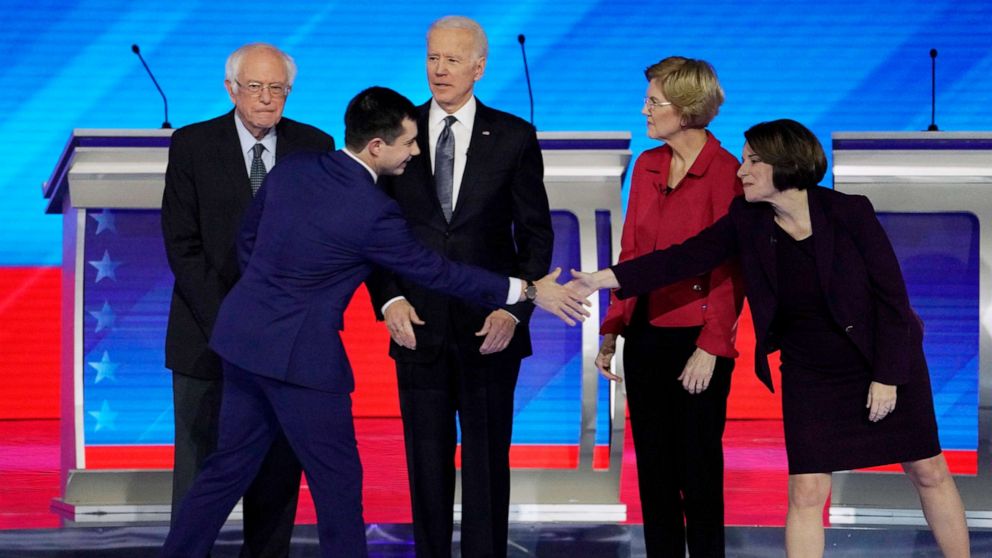[ad_1]
It is also the final debate before the candidates compete on Super Tuesday.
The Democratic National Committee on Saturday unveiled the qualifying criteria for the last Democratic primary debate of February, set to take place in the early nominating state of South Carolina — just days before the Palmetto state’s primary.
Much like the first three debates of 2020, the candidates have two pathways for securing a spot on the debate stage on Feb. 25, either by reaching the delegate threshold or scoring enough support through the polling criteria.
To qualify with delegates, the candidates must receive at least one pledged delegate to the Democratic National Convention from any of the first three nominating contests in Iowa, New Hampshire or Nevada.
Candidates can also earn a podium by either receiving at least 10% in four national or single-state polls of South Carolina, or receive at least 12% in two single-state polls in South Carolina between Feb. 4 and Feb. 24 at 11:59 p.m. ET, the day before the match up.
The only changes from the Nevada debate — slated for Wednesday Feb. 19 — are the shorter window for polling and only including South Carolina polling, among the early states, for the qualifying criteria.
Among the candidates currently set to face off in the debate, co-hosted by CBS News and the Congressional Black Caucus Institute, along with Twitter, at the Gaillard Center in Charleston, are: former Vice President Joe Biden, former South Bend, Ind., Mayor Pete Buttigieg, Minnesota Sen. Amy Klobuchar, Vermont Sen. Bernie Sanders, and Massachusetts Sen. Elizabeth Warren, according to an ABC News analysis.
On the cusp of snagging a spot is billionaire and former New York City mayor Michael Bloomberg, who currently has two qualifying polls on his way to four.
For the polls to count toward the qualifying threshold, they must also be sponsored by the following entities: Associated Press; ABC News/Washington Post; CBS News/YouGov; CNN; Fox News; Monmouth University; National Public Radio; NBC News/Wall Street Journal; NBC News/Marist; New York Times; Quinnipiac University; USA Today/Suffolk University; Winthrop University. But the DNC also reserves the right to add any South Carolina-specific poll sponsor to this list in the near future.
For the four-poll pathway, each poll must be sponsored by different organizations, or if sponsored by the same organization, be covering different geographical areas. But polls can be conducted by the same organization and/or covering the same region to count toward the early state polling threshold.
The debate will also be the last one ahead of Super Tuesday, when the candidates will compete in 15 contests on March 3, by far the broadest map of the presidential primary cycle in a single night.
The DNC announced on Friday that the succeeding debate after South Carolina will be held on March 15 in Phoenix, Arizona, a state considered a battleground in 2020.
But in the meantime, only five presidential hopefuls have so far met the threshold needed to square off on Wednesday in the Las Vegas debate, a few days before Saturday’s highly-anticipated caucuses, according to an ABC News analysis. Those who have qualified so far are: are: include Biden, Buttigieg, Klobuchar, Sanders and Warren.
The remaining candidates have until Tuesday at 11:59 p.m. ET to qualify, leaving the door open for others to make the stage.
Similar to Nevada, South Carolina presents an early opportunity for the Democratic contenders to test their strength among a more diverse electorate, with a greater Latino population in Nevada and a significant black voting bloc in South Carolina.
Some of the candidates, like Biden, are banking on strong support from minority communities in the last of the early states to reset the primary race and regain a top tier position.
“The reason why we are here is because, you know, 99% of the African American vote hasn’t spoken yet and 99% of Latino vote hasn’t spoken yet,” Biden said in Las Vegas, in an effort to remind supporters that communities of color have not yet weighed in on the Democratic primary field, after Iowa and New Hampshire, two states with predominately white populations.
[ad_2]
Source link

